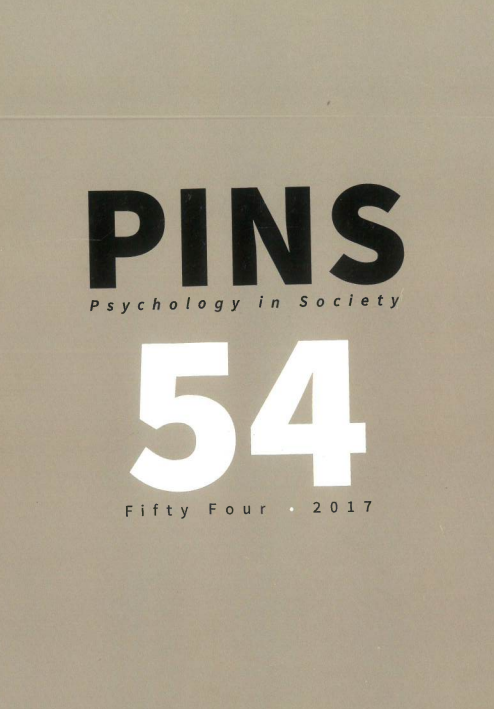Six theses on African Psychology for the world
DOI:
https://doi.org/10.17159/2309-8708/2017/n54a1Keywords:
African psychologyAbstract
Thesis 1: All of human psychology is African psychology
Read from below, from the perspective of victims of slavery, colonialism and contemporary racism, histories of knowledge are reminders of subjection. Europe’s triumphant march of progress expresses the destruction of indigenous know-how. European civilisation implies the dehumanisation of locals. Any history of indigenous African psychology is therefore a history of subjugated knowledge. Like all histories of victims of legislated dehumanisation, be they of the first nations, indigenous people, blacks, women and queers, such a history will always be entangled. It is outside history, against the archive, reflective of conquest. It speaks to loss, haunted by attempts at rediscovery.
Thesis 2: The spirits of European philosophers and United States (US) poets in psychology in Africa
Psychology in the non-colloquial sense refers to disciplined knowledge. It is the systematic study of the psyche. That is one definition. It is not undisputed. Other psychologists prefer the study of behaviour. That is another definition. Not everyone agrees with it. There is actually no universally agreed upon definition.
Thesis 3: A need exists for more interchanges and more openness to influence each other
To state that psychology in Africa has been influenced by European presuppositions, notions and morals is not to be interpreted as arguing for expunging all foreign ideas. In his contribution to the present issue, Augustine Nwoye, contends “although some Eurocentric theories of the human personality or personhood … already exist, including those developed by some African American psychologists … some of which are very relevant to our experience, a continental African version of the theory of African human personhood is still needed”. Nwoye is arguing for a universal psychology of pluriversal psychologies, a multiplicity of views of the personhood instead of a domineering Euro-American centred perspective of the self. In passing, given the dearth of African centred theories of personality, I conjecture that over time Nwoye’s article, “An Africentric theory of human personhood”, is going to be very influential and well-debated.
Thesis 4: Black psychology is linked to but not identical with African psychology
In 1969 Noel Chabani Manganyi (2013) published his paper on hysteria among African women. The following year he completed a doctorate in psychology at the University of South Africa. Because he is black, Manganyi could be seen as the rightful father of African psychology and, therefore that the history African psychology begins in the late 1960s.
Thesis 5: A distinction is made between extraverted, Western European/US American-centric psychology in Africa and introverted, African-centred psychology
So confusion reigns when surveying African psychology. Elsewhere I have said, unless one twists oneself into knots, “all of psychology done in and for Africa, about Africans, by Africans as well as non-Africans (working on Africa) is African psychology” (Ratele, 2017b: 1). It is clearly a straightforward matter, I averred, except when it is not. And the latter, not the former, is usually the state of affairs.
Thesis 6: A critical African-centred psychology between African psychology and critical psychology
Following the founding of the African Psychology Forum in 2009 as a division of Psychological Society of South Africa, the debates on, among other things, the uses, definition, status, aims, and approaches of African psychology were reignited. However, there is still often more heat than light about what is African Psychology and why we might need it or not.
Downloads
Downloads
Published
How to Cite
Issue
Section
License
This journal is an open access journal, and the authors' and journal should be properly acknowledged, when works are cited.
Authors may use the publishers version for teaching purposes, in books, theses, dissertations, conferences and conference papers.
A copy of the authors’ publishers version may also be hosted on the following websites:
- Non-commercial personal homepage or blog.
- Institutional webpage.
- Authors Institutional Repository.
The following notice should accompany such a posting on the website: “This is an electronic version of an article published in PINS, Volume XXX, number XXX, pages XXX–XXX”, DOI. Authors should also supply a hyperlink to the original paper or indicate where the original paper (http://www.journals.ac.za/index.php/pins) may be found.
Authors publishers version, affiliated with the Stellenbosch University will be automatically deposited in the University’s’ Institutional Repository SUNScholar.
Articles as a whole, may not be re-published with another journal.
The copyright of the article(s) lies with the author(s).
The copyright of the journal lies with PINS-psychology in Society.
The following license applies:
Attribution CC BY-NC-ND 4.0 - https://creativecommons.org/licenses/by-nc-nd/4.0/

